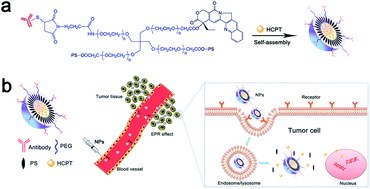当前位置:
X-MOL 学术
›
J. Mater. Chem. B
›
论文详情
Our official English website, www.x-mol.net, welcomes your
feedback! (Note: you will need to create a separate account there.)
A novel self-assembled pH-sensitive targeted nanoparticle platform based on antibody–4arm-polyethylene glycol–pterostilbene conjugates for co-delivery of anticancer drugs
Journal of Materials Chemistry B ( IF 6.1 ) Pub Date : 2017-12-18 00:00:00 , DOI: 10.1039/c7tb02485a Ke-Feng Liu 1, 2, 3, 4 , Yan-Xue Liu 1, 2, 3, 4 , Lin Dai 5, 6, 7, 8 , Chun-Xiao Li 1, 2, 3, 4 , Luying Wang 1, 2, 3, 4 , Jing Liu 1, 2, 3, 4 , Jian-Du Lei 1, 2, 3, 4
Journal of Materials Chemistry B ( IF 6.1 ) Pub Date : 2017-12-18 00:00:00 , DOI: 10.1039/c7tb02485a Ke-Feng Liu 1, 2, 3, 4 , Yan-Xue Liu 1, 2, 3, 4 , Lin Dai 5, 6, 7, 8 , Chun-Xiao Li 1, 2, 3, 4 , Luying Wang 1, 2, 3, 4 , Jing Liu 1, 2, 3, 4 , Jian-Du Lei 1, 2, 3, 4
Affiliation

|
Recently, antibody–drug conjugates (ADC) have shown potential for cancer immunotherapy by tumor-targeted delivery of anticancer drugs. However, the development of ADC is subject to many restrictions, such as the payloads, stabilities and intracellular uptake of the drugs, which has greatly restricted their clinical application. To overcome these hurdles, in this study, a novel pH-sensitive targeted nanoparticle platform based on a newly synthesized amphipathic antibody–drug conjugate (antibody–4arm-polyethylene glycol–pterostilbene, mAb–4arm-PEG–PS) was fabricated for co-delivery of another anticancer drug (10-hydroxy camptothecin, HCPT). The prepared mAb–4arm-PEG–PS/HCPT nanoparticles (NPs) had a moderate particle size (∼120 nm), a high drug to antibody ratio (∼22.4) and relatively high binary drug loading capacity (∼24.2 wt% HCPT, ∼2.9 wt% PS). Moreover, the mAb–4arm-PEG–PS/HCPT NPs exhibited enhanced intracellular uptake (∼5 fold that of mAb–4arm-PEG–PS conjugates) and excellent cytotoxicity in vitro. In subsequent Daudi lymphoma xenograft assays, compared with free drugs and mAb–4arm-PEG–PS conjugates, the mAb–4arm-PEG–PS/HCPT NPs inhibited tumor growth more efficiently. Our results indicated the great potential of mAb–4arm-PEG–PS/HCPT NPs for targeted co-delivery of anticancer drugs to solid tumors.
中文翻译:

基于抗体–4臂-聚乙二醇–季戊二烯共轭物的新型自组装pH敏感靶向纳米颗粒平台,用于共同递送抗癌药物
最近,抗体-药物偶联物(ADC)通过肿瘤靶向的抗癌药物的递送显示出了用于癌症免疫治疗的潜力。然而,ADC的发展受到许多限制,例如药物的有效载荷,稳定性和细胞内摄取,这极大地限制了其临床应用。为了克服这些障碍,在这项研究中,基于新型两亲性抗体-药物偶联物(抗体-4臂-聚乙二醇-sti,mAb- 4臂-PEG-PS)制备了一种新型的pH敏感的靶向纳米颗粒平台。交付另一种抗癌药物(10-羟基喜树碱,HCPT)。制备的mAb-4arm-PEG-PS / HCPT纳米颗粒(NPs)具有中等粒径(〜120 nm),较高的药物与抗体比率(〜22.4)和相对较高的二元药物载量(〜24.2 wt%HCPT,约2.9 wt%PS)。体外。在随后的Daudi淋巴瘤异种移植测定中,与游离药物和mAb-4arm-PEG-PS缀合物相比,mAb-4arm-PEG-PS / HCPT NPs更有效地抑制了肿瘤的生长。我们的结果表明,mAb-4arm-PEG-PS / HCPT NP具有将抗癌药物靶向共递送至实体瘤的巨大潜力。
更新日期:2017-12-18
中文翻译:

基于抗体–4臂-聚乙二醇–季戊二烯共轭物的新型自组装pH敏感靶向纳米颗粒平台,用于共同递送抗癌药物
最近,抗体-药物偶联物(ADC)通过肿瘤靶向的抗癌药物的递送显示出了用于癌症免疫治疗的潜力。然而,ADC的发展受到许多限制,例如药物的有效载荷,稳定性和细胞内摄取,这极大地限制了其临床应用。为了克服这些障碍,在这项研究中,基于新型两亲性抗体-药物偶联物(抗体-4臂-聚乙二醇-sti,mAb- 4臂-PEG-PS)制备了一种新型的pH敏感的靶向纳米颗粒平台。交付另一种抗癌药物(10-羟基喜树碱,HCPT)。制备的mAb-4arm-PEG-PS / HCPT纳米颗粒(NPs)具有中等粒径(〜120 nm),较高的药物与抗体比率(〜22.4)和相对较高的二元药物载量(〜24.2 wt%HCPT,约2.9 wt%PS)。体外。在随后的Daudi淋巴瘤异种移植测定中,与游离药物和mAb-4arm-PEG-PS缀合物相比,mAb-4arm-PEG-PS / HCPT NPs更有效地抑制了肿瘤的生长。我们的结果表明,mAb-4arm-PEG-PS / HCPT NP具有将抗癌药物靶向共递送至实体瘤的巨大潜力。











































 京公网安备 11010802027423号
京公网安备 11010802027423号